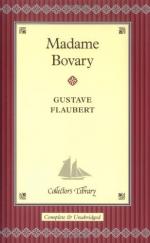|
This section contains 4,530 words (approx. 16 pages at 300 words per page) |

|
SOURCE: "Time and History in Madame Bovary" in French Studies: A Quarterly Review, Vol. XLIX, No. 3, July, 1995, pp. 283-91.
In the following essay, Green explores "the way in which [Flaubert's value-laden approach to [the concept of] time informs Madame Bovary."]
—Nous ne sommes jamais au Présent qui seul est important dans la vie.1
—Le Présent est tout ce qu'il y a de moins important, car il est très court, insaisissable. Le vrai, c'est le Passé, et l'Avenir.2
These mutually contradictory comments from Flaubert's Correspondance are evidence of his long-standing preoccupation with the way in which we perceive time. His letters show him to be particularly sensitive to the personal and subjective nature of time, which he variously sees as destructive or consoling, as a force for change or an indicator of stasis, or as evidence of a particular state of mind.3 But the comments I...
|
This section contains 4,530 words (approx. 16 pages at 300 words per page) |

|


